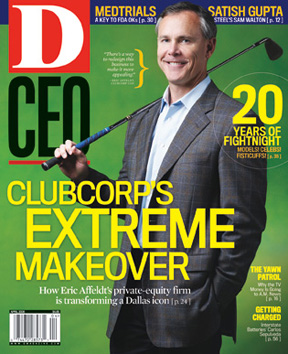The cynical mainstream press likes to portray them as heartless pirates who smoke $100 cigars and flit around in private jets and make more money than God or Harold Simmons. So is it any wonder that private-equity firms are viewed so negatively these days?
The real question, though, is whether the negative characterization is justified. Answering that was a big reason we set out recently to look at the 2006 acquisition of private-clubs owner ClubCorp Inc. by KSL Capital Partners LLC, a Denver-based private-equity firm.
The KSL deal, which is transforming one of Dallas’ oldest, most iconic companies, proved to be a fascinating case study. As reported in this month’s cover story (“The Ace of Clubs”), KSL’s ClubCorp stewardship has generated some pain, but also some hopeful signs of progress.
Ten percent of the headquarters employees were laid off early on and an employee stock-ownership plan was scrapped, among other cost-cutting measures. At the same time, ClubCorp’s private clubs around the country began to be updated and repositioned for the long haul. And the “new” ClubCorp earned more money last year than ever in its 50-year history.
News flash for the cynics: Making money is a positive thing in our free-enterprise system. And this is exactly the way private equity is supposed to work. Indeed, it’s why the sector is considered by experts to play a vital, rejuvenating role in modern American capitalism.
Private equity rose to the fore in recent years thanks to low interest rates, strong stock prices, and the over-reaching efforts of Sarbanes-Oxley, which has made things tough on public companies. Snapping up underperforming or undercapitalized companies with leverage and making the companies more efficient is a good thing—one with many benefits for our economy overall.
But what about the “heartless” charge—a scenario in which the greedheads supposedly oversee mass layoffs before selling their prey and moving callously on? Observers say it’s largely untrue. “Just cutting heads is not typically the M.O.,” says Dirk B. Landis, national managing partner for private-equity services at Tatum LLC, a consulting firm. “Some firms will strip and flip, but there aren’t many of those.”
Thanks to the press as well as business-bashing pols, however, not everyone knows this. It’s downright unpopular for rich people to get richer nowadays. And the higher-taxes crowd sees private equity as a convenient target for filling its coffers.
Congress abandoned one effort to soak the industry last year, after learning that the Barbarians at the Gate caricature wasn’t exactly accurate. But don’t be surprised if the effort resurfaces, especially if the Democrats recapture the White House.
Meantime, we keep remembering how Frank Gore, a ClubCorp vice president who’s been with the company for 30 years, contrasted life under the former ownership with life under KSL.
“We had plateaued. We were a very fine company but, to grow again, to get to the next level, we had to do things differently,” Gore said. “Now we’re trying to build the company for the next generation.”
Here’s hoping they succeed.





